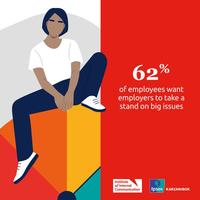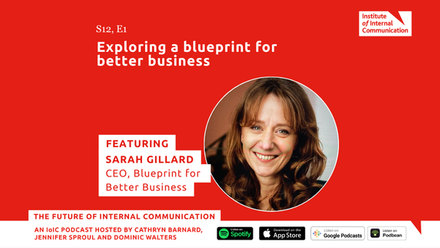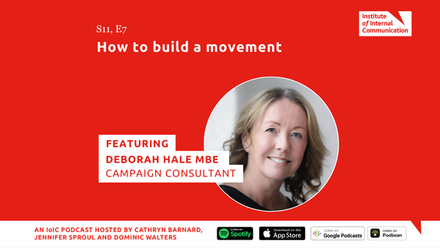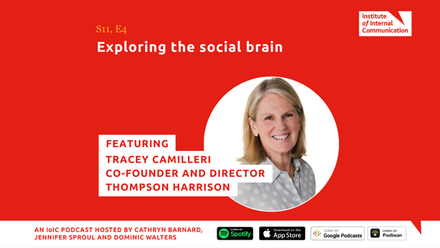The 2024 IC Index, a research programme conducted by the IoIC and Ipsos Karian and Box, presents rich insight for anyone involved with workplace engagement, culture and performance.
4,000 UK-based employees were surveyed in early 2024 to reveal how internal communication is perceived within organisations. The data analysis highlights the vital role of internal communication in maintaining organisational cohesion, focus and performance.
Where workers rated internal communication as excellent, the research showed a 40-point boost in engagement. This is compelling for any business leader, not least when 2024 research undertaken by Gallup positions the UK 33rd out of 38 European countries for engagement.
Resuming pre-pandemic levels of productivity and moving beyond the economic consequences of Brexit is surely top of most board agendas and an increasingly pressing concern for senior executives of all stripes.
Restoring engagement and productivity are matters of huge national importance.
What is engagement and why does it matter?
In 2008, following the global financial crash, the UK Government commissioned David MacLeod and Nita Clarke to answer these questions. Concerned by the impact of the credit crunch on the British economy, the then Secretary of State for Business, Innovation and Skills sought to better understand employee engagement.
What was it? What impact did it have on individuals, teams and organisations? And if it could be proven to positively correlate with competitiveness, productivity, performance and profitability, what were the key ingredients that led to engaged organisations?
Clarke and MacLeod’s 2009 Engaging for Success report not only resoundingly linked engagement and performance, but it also presented four enablers of engagement. Each of these were consistently present in the organisations the researchers studied and they reinforce the criticality of placing human factors at the heart of any business strategy.
Most importantly for our profession, each enabler represents opportunity for internal communicators to shape, influence and improve organisational performance.
In 2011, a UK taskforce set out to raise the profile of employee engagement and position it as a crucial element of sustainable economic prosperity. In 2012, the all-volunteer Engage for Success (E4S) community and movement launched – with the lofty goal of positioning engagement as a primary lever of organisational performance and integral to workplace wellbeing.
Since then, the engagement sub-sector has exploded. An ever–expanding range of engagement survey software measures how people feel about where they work and there’s no shortage of conferences and events that showcase the importance of understanding the psychology of work.
And yet in far too many workplaces, the enablers of engagement remain unaddressed.
Introducing the Employee Engagement Index
In 2022, E4S returned to its research roots, to understand the impact of the pandemic on UK engagement. In parallel, it sought to develop an Employee Engagement Index (EEI), to establish a straightforward to use benchmark for measuring engagement.
The EEI helps organisations better understand how their engagement data compares with elsewhere so that it can be improved. Measurement is, after all, one thing. It’s another thing entirely to take data and act upon it to shift the perception of working conditions in the eyes of employees.
Undertaken in partnership with Nottingham Business School, E4S’s research provides much-needed rigour to engagement data analysis. And – because respondents are not linked to their organisations – it presents more credible data as answers are given more freely and authentically.
Now in its second year, the E4S Employee Engagement Survey 2023 bears robust fruit for internal communicators. Compellingly, it accentuates the findings of the IC Index and compounds the increasingly urgent business case for the profession to help rehumanise work.
Let’s take a closer look.
The EEI score is calculated using three questions that assess satisfaction, advocacy, and loyalty. While 2023’s data worryingly shows no improvement in UK engagement levels since 2022, it nonetheless offers illuminating insights to assist internal communicators in calling for people issues at work to be addressed. This is a powerful opportunity to demonstrate strategic value.
And not a moment too soon. Another year of economic instability, cost-of-living anxiety, climate crisis and sustainability concerns and ongoing hybrid work tensions are prolonging apathy at work and fuelling disengagement.
Across the board, it’s clear workers of all employment types want better communication and relationship with their workplace peers. This bears out when we align various research findings, including the IC Index, with the four enablers of engagement.
The four enablers of engagement
- Strategic narrative
A key feature of engaged organisations is an authentic, compelling and accessible strategic narrative. Harvard Business Review describes strategic narrative as an organisational story that “defines the company’s vision, communicates the strategy, and embodies the culture.”
More than ever, people at work today want to work for a cause they can believe in. They want to do work that matters and as the 2024 IC Index shows, a healthy 62% majority want their employers to take a stance on societal and environmental issues.

A well-crafted strategic narrative acts as a north star for the organisation and outlines the business strategy, which, in the tumultuous 2020s, will be in constant need of recalibration.
The IC Index reinforces the power of sharing the business strategy. When people at work understand their employer’s business strategy, and more importantly, how they personally can contribute to it, the data shows a 35-point jump in belief that it’s the right plan for business success.
Given the ambiguity that the forces shaping the future of work present, an iterative strategic narrative that reflects the overarching values of an organisation is imperative. Regardless of the fast-paced and volatile nature of the external environment, internal stakeholders need a consistently clear story that focuses their work on achieving strategic goals.
- Employee voice
EFS considers employee voice evident “where an organisation sees its people not as the problem, rather as central to the solution, to be involved, listened to, and invited to contribute their experience, expertise, and ideas.” The concept of voice exists when stakeholders conceive of an iterative internal conversation between all colleagues – regardless of function or seniority – to make sure every voice is heard.
Feeling your opinions matter at work is important. Feeling psychologically safe enough to speak up is key, as are the right environmental conditions to share views and perspectives.
As John Higgins, co-author of Speak Up: Say what needs to be said and hear what needs to be heard has so powerfully written, “to strip someone of their voice is to eviscerate their identity. To prescribe a way of knowing, to speak on someone’s behalf is to disappear them.”
E4S’s research measured the efficacy of a range of interventions to help staff feel part of workplace decision-making. These include one-to-one line manager meetings, team and departmental meetings, annual surveys, anonymous feedback mechanisms, community groups, pulse surveys, focus groups and online forums for employees.
40% of respondents experienced five or more voice methods at work resulting in an average EEI score of 68%. This is 6% higher than the current average score. The data showed using a combination of methods to enable employee voice had the biggest impact on EEI scores. Where respondents experienced only one or two voice methods, their EEI scores presented at 5% lower than the current average score. The 2024 IC Index also highlights the importance of feeling listened to and supported by line managers.
Enabling voice is crucial for the future of work. The pace and breadth of shifts in the external environment is such that all internal stakeholders must act as sensory nodes for the organisation, interpreting context as it unfolds. If colleagues don’t feel empowered to speak up, the wider organisation loses access to the advantage of urgently needed collective intelligence.
- Engaging managers
E4S describes engaging managers as those who “focus their people and give them scope, treat people as individuals and coach and stretch” them.
Its 2022 research highlighted a positive relationship between the availability of learning (L&D) opportunities and employee engagement. The 2023 EEI corroborates this. Those with access to five or more L&D opportunities had an EEI score 25% higher than respondents who had no access to such developmental opportunities.
Engaging managers invest in team wellbeing and are committed to helping each teammate realise their full potential. Having someone who provides feedback on performance shows up in the 2024 IC Index research as well – UK workers clearly crave a supportive and humane relationship with their line managers.
As already mentioned, this year’s IC Index also accentuates the importance of understanding how each individual can contribute towards delivery of the business strategy. While on the one hand, a well-crafted strategic narrative sets the scene, on the other, it’s the exemplary communication skills of line managers that help align the work of each team member with strategic goals.
Yet various data show a lack of investment in manager training. The 2024 IC Index highlighted only a quarter of managers felt equipped to support team members with the personal issues that will inevitably derail focus and performance.
2023 research by the Chartered Management Institute (CMI) revealed only 18% of those with management responsibility have completed any formal training to equip them for this work. This is significant, not least when their data shows investment in management training delivers an average 23% increase in organisational performance and a 32% increase in employee engagement and productivity.
As operating conditions become ever more challenging, having managers with strong communication and interpersonal skills is key. Moreover, there are fundamentals of communication – clear, empathic language, strong listening skills and the ability to mediate difficult conversations, for example – that are now essential skills for optimal team performance. Investing in these skills is a prerequisite for any ambitious organisation.
- Organisational integrity
Organisational integrity is the final enabler of engagement. E4S describes this as existing when the values ‘on the wall’ are reflected in the day-to-day behaviours of those within the business. There is no say-do gap.
Organisational integrity is key to trust building at work – a primary area of focus for the IoIC. As the 2024 IC Index shows, it’s becoming harder to maintain levels of organisational integrity, not least when 64% believe the organisation prioritises shareholders and profits and a staggering 33% believe the CEO places their personal interests above all other.
The ongoing hybrid work debate adds fuel to the fire, eroding trust still further. The 2024 IC Index found more than two in three believe their employer lied about the reasons for a full return to the office. What impact does perceptions of lying have on organisational performance?
When people feel their views and preferences haven’t been factored into decision-making, this can only breed scepticism, cynicism and apathy for organisational objectives.
Optimal market responsiveness and organisational agility is an essential feature of success in the future of work. If businesses won't accept more flexible ways of working, how will they ever manage to attain the flexibility needed to navigate the inevitable turbulence and complexity of the coming decade(s)?
Conclusion
As the data from both E4S and the IC Index show, good internal communication is a primary driver of colleague engagement. Done well, it has the capacity to significantly transform productivity and performance, ensuring alignment with business goals and enhancing the wellbeing of all involved.
As they continue to navigate the uncertainties posed by increasingly volatile operating environments, organisations must harness the collective intelligence of the many, rather than the few. Command and control management hierarchies simply don’t work in complex trading conditions. Decision-making must become decentralised if organisations are to attain the agility required to optimally respond to market forces as they arise.
Increasingly fast-paced and fluid futures require world-class communication to maintain clarity, focus and a shared sense of purpose and belonging. Internal communication is mission-critical for any discerning organisation aspiring to thrive in the coming decades.






